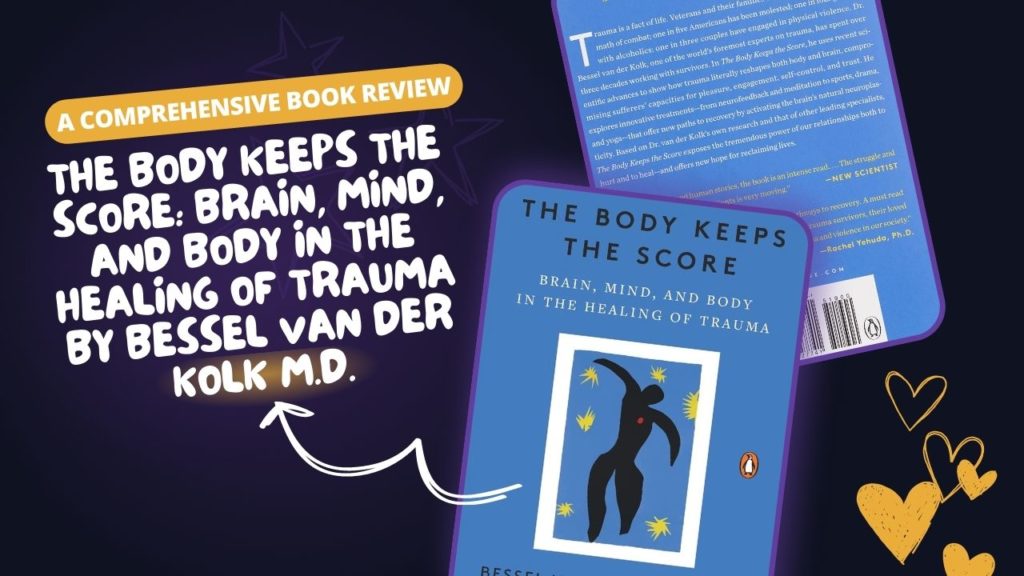eBook This – The Body Keeps the Score is a groundbreaking book that explores the impact of trauma on the human body and mind, and the importance of holistic healing in order to overcome its effects.
Author Bessel van der Kolk, a leading expert in the field of trauma and PTSD, draws on decades of research and clinical experience to show how trauma can be stored not only in our memories, but also in our bodies, leading to a wide range of physical and psychological symptoms.
Through a series of compelling case studies, he demonstrates how integrating traditional talk therapy with body-oriented approaches such as yoga, meditation, and somatic experiencing can help people to process and heal from traumatic experiences.
The Science of Trauma
The Body Keeps the Score provides a comprehensive overview of the science of trauma and its effects on the brain and body.
Van der Kolk explains how trauma can lead to changes in brain structure and function, particularly in the areas responsible for regulating emotions, thoughts, and behaviors.
He also describes how trauma can impact the nervous system, causing a hyper-arousal response that can persist long after the traumatic event has ended.
Throughout the book, Van der Kolk emphasizes the importance of a holistic approach to healing, recognizing the complex interplay between mind, body, and emotions in the aftermath of trauma.
Innovative Approaches to Healing
One of the most compelling aspects of The Body Keeps the Score is its focus on innovative and holistic approaches to healing from trauma.
Van der Kolk provides a detailed overview of techniques such as yoga, meditation, and somatic experiencing, which are designed to help individuals process and heal from traumatic experiences by working directly with the body.
He also describes the role of movement and exercise in helping to regulate the nervous system, and provides practical advice for incorporating these techniques into a comprehensive treatment plan.
Compelling Case Studies
The Body Keeps the Score is filled with compelling case studies that illustrate the impact of trauma on individuals and the importance of holistic healing.
Van der Kolk provides vivid descriptions of his patients, highlighting the unique challenges they face and the ways in which they have overcome them through a combination of talk therapy and body-oriented approaches.
These stories are powerful and inspiring, providing hope for those who are struggling with the aftermath of trauma.
Final Thoughts
The Body Keeps the Score is a must-read for anyone interested in the science of trauma and its effects on the human body and mind.
It provides a comprehensive overview of the latest research and clinical practices, and offers a hopeful message for those who are looking to overcome the impact of trauma.
Van der Kolk’s writing is accessible and engaging, making this book a valuable resource for mental health professionals, patients, and anyone seeking to better understand the complex interplay between mind, body, and emotions in the aftermath of traumatic events.
Whether you are a mental health professional seeking to expand your knowledge, or an individual looking to heal from trauma, this book provides a wealth of information and practical advice for navigating the journey towards healing and recovery.
About The Author
Bessel van der Kolk, M.D. is a world-renowned psychiatrist, researcher, and teacher who has been at the forefront of the study of trauma and its impact on human behavior for over 40 years.
He is the founder and medical director of the Trauma Center in Brookline, Massachusetts, where he has developed innovative treatments for trauma survivors.
He is also a professor of psychiatry at Boston University School of Medicine and has been honored with numerous awards for his groundbreaking work.
He is a sought-after speaker and has written numerous articles and books on the topic of trauma, including “The Body Keeps the Score: Brain, Mind, and Body in the Healing of Trauma.”
Pros and Cons
Pros:
- Comprehensive Overview of Trauma: The author, Bessel van der Kolk, provides a comprehensive overview of trauma and its effects on the brain, mind, and body. He covers a wide range of topics, including the physiological and psychological effects of trauma, and the various ways in which trauma can manifest in individuals.
- Integrative Approach: The author takes an integrative approach, bringing together the latest research and findings from various fields, such as neuroscience, psychology, and psychiatry, to provide a comprehensive understanding of trauma and its effects.
- Evidence-Based: The author provides a wealth of evidence-based research and studies to support his arguments and findings. He also includes case studies and examples to illustrate the effects of trauma and the healing process.
- Emphasis on Treatment: The author places a strong emphasis on the importance of treatment and healing for those who have experienced trauma. He provides practical tips and guidance for those seeking help, and explains the various types of therapy and treatment that are available.
- Accessible Writing Style: The author writes in an accessible and engaging style, making the book accessible to a wide range of readers, including those with no prior knowledge of the subject.
Cons:
- Technical Language: While the author writes in an accessible style, some readers may find the technical language used in the book to be difficult to understand.
- Heavy Material: The subject matter of the book can be heavy and distressing for some readers, as it deals with the effects of trauma and the healing process.
- Lack of Cultural Diversity: The author’s focus is primarily on Western perspectives and treatments, and may not fully address the experiences and cultural perspectives of individuals from diverse backgrounds.
- Limited Focus on Prevention: While the author focuses on treatment and healing, he does not delve into the topic of prevention, and how to prevent trauma from happening in the first place.
- Reliance on Western Medical Model: The author relies heavily on the Western medical model and may not fully address alternative approaches to healing and treatment.







